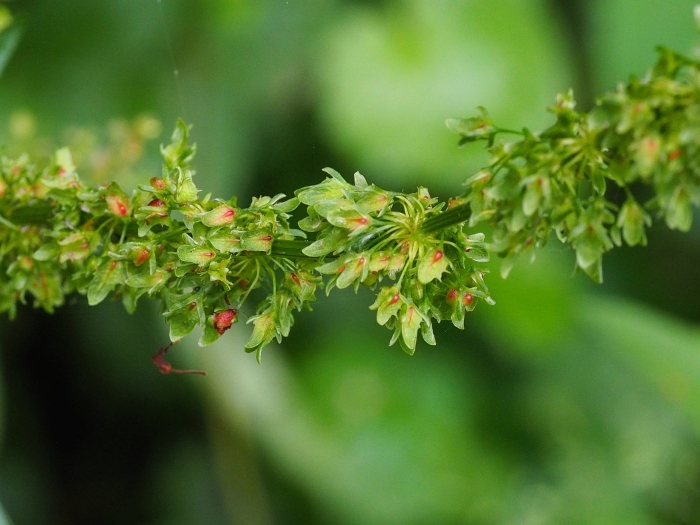Bitter Dock
(Rumex obtusifolius)
Bitter Dock (Rumex obtusifolius)
/
/

olrett
CC BY-SA 4.0
Image By:
olrett
Recorded By:
Copyright:
CC BY-SA 4.0
Copyright Notice:
Photo by: olrett | License Type: CC BY-SA 4.0 | License URL: http://creativecommons.org/licenses/by-sa/4.0/ | Rights Holder: olrett | Publisher: iNaturalist | Date Created: 2022-05-24T12:49:08-07:00 |
























Estimated Native Range
Summary
Rumex obtusifolius, commonly known as bitter dock or broad-leaved dock, is a perennial herb that is native to Europe and has become naturalized across all temperate continents. It typically grows to a height of 16-59 inches (40-150 cm) and features large, oval to heart-shaped leaves with a wavy or slightly toothed margin, and reddish stems that are stout and erect. The plant is commonly found in disturbed areas such as roadsides, ditches, and meadows, as well as in riparian zones and field margins. It produces small greenish flowers from June to October, which are arranged in dense whorls along the flowering stalk and turn reddish-brown as they mature. The flowers are not particularly showy, but the plant is known for its persistence and resilience.
Bitter dock is valued for its medicinal properties, as the leaves have been used traditionally to treat various ailments. However, it is also considered a weed in many regions due to its aggressive growth and ability to outcompete native vegetation. In cultivation, it prefers full sun to part shade and can tolerate a wide range of soil types, though it thrives in moist, fertile soils. It is often found in urban waste spaces and is not typically cultivated in gardens due to its invasive nature. Gardeners should be cautious, as it can spread rapidly via its deep taproot and prolific seed production.CC BY-SA 4.0
Bitter dock is valued for its medicinal properties, as the leaves have been used traditionally to treat various ailments. However, it is also considered a weed in many regions due to its aggressive growth and ability to outcompete native vegetation. In cultivation, it prefers full sun to part shade and can tolerate a wide range of soil types, though it thrives in moist, fertile soils. It is often found in urban waste spaces and is not typically cultivated in gardens due to its invasive nature. Gardeners should be cautious, as it can spread rapidly via its deep taproot and prolific seed production.CC BY-SA 4.0
Plant Description
- Plant Type: Herb
- Height: 2-5 feet
- Width: 1-2 feet
- Growth Rate: Rapid
- Flower Color: Green
- Flowering Season: Summer
- Leaf Retention: Deciduous
Growth Requirements
- Sun: Full Sun, Part Shade
- Water: Medium
- Drainage: Medium, Fast
Common Uses
Edible*Disclaimer: Easyscape's listed plant edibility is for informational use. Always verify the safety and proper identification of any plant before consumption., Erosion Control, Low Maintenance
Natural Habitat
Native to Europe and naturalized in temperate regions, commonly found in disturbed areas, riparian zones, and field margins
Other Names
Common Names: Broad-leaved Dock, Bluntleaf Dock, Broadleaf Dock
Scientific Names: , Rumex obtusifolius, Acetosa oblongifolia, Rumex acutus, Rumex obtusifolius subsp. transiens, Rumex sanguineus,
GBIF Accepted Name: